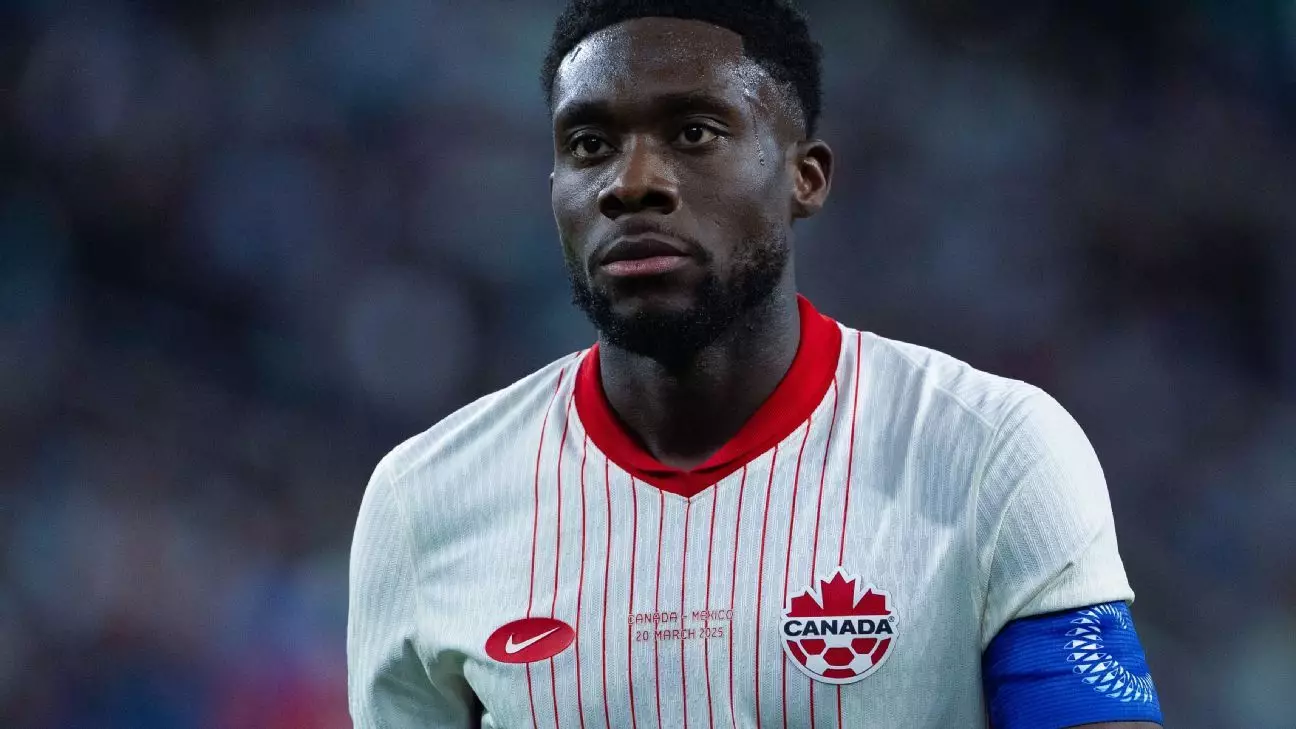Alphonso Davies, a beacon of talent in Canadian soccer and a pivotal player for Bayern Munich, recently found himself embroiled in a controversial situation that highlights the complexities of athlete management at high-stakes events. While his talent on the field is undeniable, the circumstances surrounding his serious injury during the Concacaf Nations League finals have ignited heated debates regarding athlete welfare and the responsibilities of sporting federations. The young athlete suffered a torn anterior cruciate ligament along with additional knee injuries in a tense match against the United States that saw Canada secure a hard-fought 2-1 victory. This triumph turned tragic, however, as it would soon lead to legal threats against Canada’s soccer federation from his club amidst accusations of mismanagement and negligence in providing medical care.
Confronting the Fallout: Bayern Munich vs. Canada Soccer
The aftermath of Davies’ injury has taken center stage, particularly with Bayern Munich openly contemplating legal action against Canada Soccer. The allegations are severe: claims that the Canadian medical staff failed to conduct a thorough assessment or provide adequate care to a clearly injured player. This situation raises important questions about the duty of care owed to athletes, especially during international competitions where the pressure to perform is immense. Bayern Munich’s chief executive, Jan-Christian Dreesen, didn’t mince words when he characterized the treatment of Davies as “grossly negligent,” indicating a serious breach in the expected norms of athlete care.
Nevertheless, Canada Soccer has responded firmly, asserting that they acted appropriately and in accordance with established medical protocols throughout the tournament. They claim that full communication was maintained with Bayern, providing updates and addressing any potential misunderstandings. At first glance, this defense may seem earnest, but the bitter undercurrent of mistrust and accountability remains. In sports, where the stakes are high and injuries can alter careers permanently, one can hardly overlook the gravity of these claims.
Medical Protocols or Political Maneuvering?
Canada Soccer’s defense hinges heavily on medical documentation and claims of adherence to care protocols. But in situations as critical as professional athlete injuries, the perception of care can weigh equally as heavily as the care itself. Did the federation prioritize Davies’ health over the tournament’s competitive ambitions? Or was there a failure that left the door open for doubts about the ethics of prioritizing a win—even at the expense of player safety? The club’s demands for a thorough investigation signal a deep-rooted concern that something went horribly wrong, yet the response from Davies’ agent, who after initial criticism, softened his tone, hints at an underlying complexity. Unlike typical binary narratives of blame, this instance unveils layers of negotiation that extend beyond mere medical protocols.
The Price of Ignoring Player Welfare
Davies is now facing a long recovery period that could keep him off the field for several months, depriving him of critical gameplay as Bayern Munich competes for both Bundesliga and Champions League titles. The impact of his injury stretches beyond Davies himself, resonating through the club’s ambitions and creating ripples within the broader Canadian soccer landscape. With the looming possibility of legal action, what are the implications for the Canadian soccer federation? This incident acts as a wake-up call, underscoring the absolute necessity for a robust support system for athletes that prioritizes health and safety, especially in high-stakes environments.
The controversy illuminates an issue that reverberates through professional sports—the balance between competitive drive and the ethical treatment of players. The stakes are continually rising as players in high-performance environments risk their physical health for fleeting glory. It’s a troubling paradox that calls for a re-examination of how soccer federations prioritize player welfare in an increasingly competitive landscape.
In this unfolding drama, the narrative offers an opportunity for introspection into what constitutes responsible management in sports, and whether current protocols truly encapsulate the interests of those they are meant to protect. The case of Alphonso Davies transcends mere injury—it opens the door to a more profound conversation about the obligations of sports organizations towards their players in both health and competitive spirit.

